How to cook perfect pasta: Simple hacks to avoid a soggy mess
Advertisement
Dining
How to cook perfect pasta: Simple hacks to avert a soggy mess
Do you add oil to the water? Tin y'all skip the table salt? How practise you lot reach that al dente bite? Pasta pros offer tips to get those restaurant-like results at domicile.
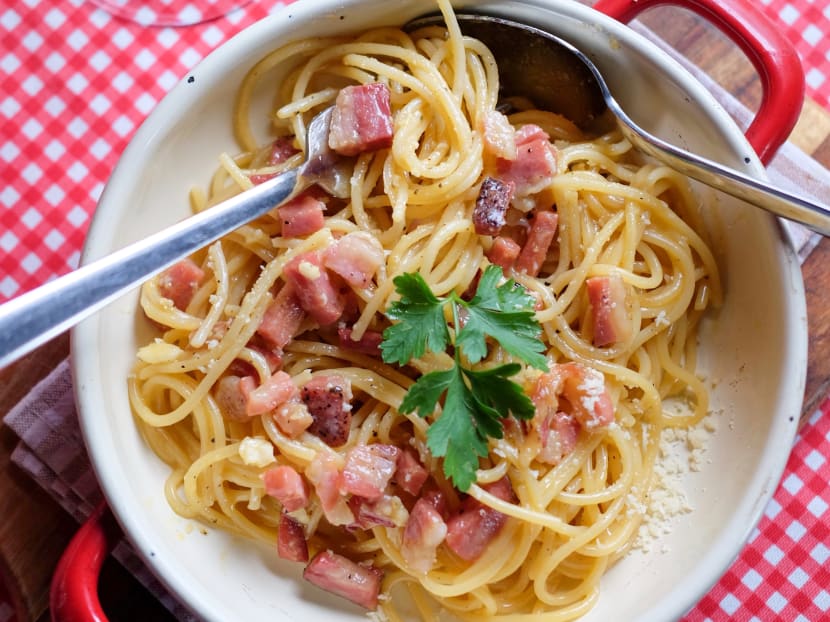
(Photograph: Unsplash/Pinar Kucuk)
24 Aug 2022 07:06AM (Updated: 24 Aug 2022 07:06AM)
Afterward the initial giddiness of having your very ain kitchen (or admission to one) subsides, the first dish that you're probably scheming on whipping up is pasta.
And for skilful reason, too. But boil up some stale pasta, empty that jar of tomato sauce into a saucepan to heat upwards, pour over the cooked pasta and you're done, right?
Information technology's non as easy peasy as preparing instant noodles in one case y'all get down to it – or y'all wouldn't be experiencing clumpy, doughy strands or request, "how firm exactly is al dente?".
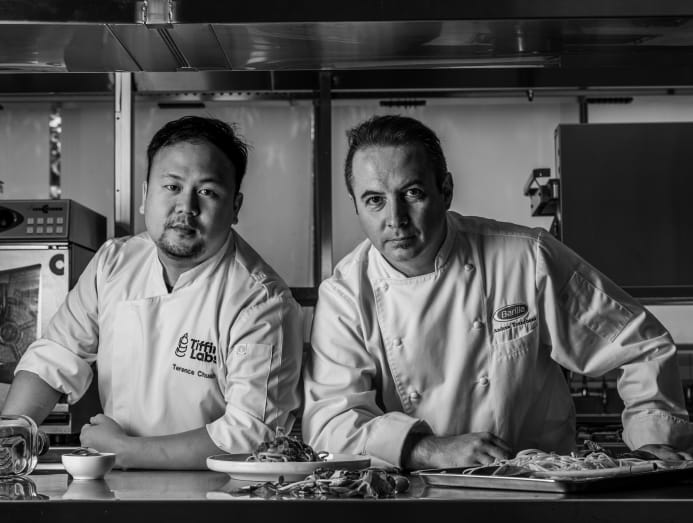
So, we posed some carb-loaded questions to Pasta Tabular array, a digital eating house created with pasta make Barilla'due south c hef Andrea Tranchero and TiffinLabs' chef Terence Chuah – both of whom have worked in Michelin-starred restaurants around the world.
And if your homecooked pasta turns out irremediable, you can always club up some authentic Italian pasta dishes from them.
Tin can I SKIP SALTING THE PASTA WATER?
Japanese chefs don't common salt the water when boiling ramen, then why must you salt the water for boiling pasta? Simply put, it'due south for better season.
"P asta dough is made without salt," said Tranchero. On the other hand, many Asian noodles such as ramen, mee pok and ban mian are made with salt, so there is already that initial layer of seasoning, he said.
Likewise, Asian noodles are thinner than pasta, which makes them absorb flavours easier when you're frying with soy sauce or pouring an umami-rich broth over them. That'due south why you don't have to salt the water to pre-season Asian noodles, said Chuah.
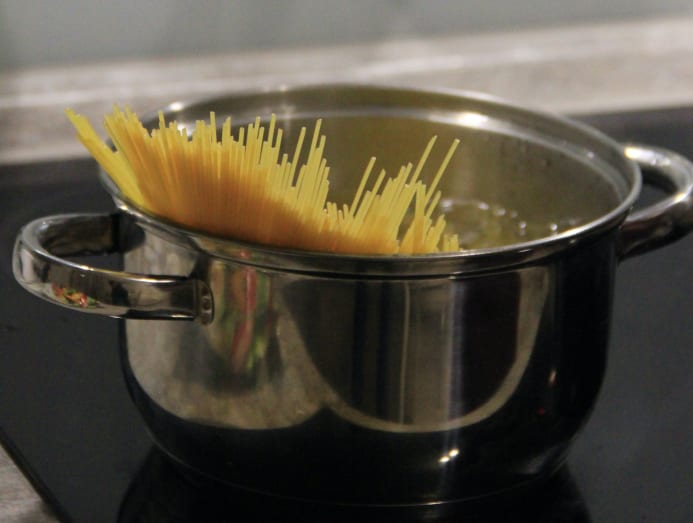
How much common salt should yous use then? A pproximately 7g of common salt per litre of water for every 100g of pasta, said Tranchero. Or one teaspoon of salt per litre of water.
But with all that salt in the boiling water and more salt in the sauce, wouldn't you lot risk catastrophe up with an over-seasoned dish?
Chuah has this tip: Instead of adding salt to the sauce, use the pasta water as seasoning. So, "give the sauce a taste to come across if it's the right seasoning for you lot. If it is, you can end there", he said.
WHAT About ADDING OIL TO THE WATER?
The consensus is, the olive oil will prevent the pasta from clumping as it cooks.
But many chefs are claiming it'southward unnecessary – and a waste of olive oil. Stirring the pasta as it's cooking is sufficient to prevent the clumping as well every bit uneven cooking.
MY SAUCE IS MORE SOUP THAN SAUCE
The flim-flam is to use the pasta h2o, said Chuah. In club for the sauce to coat the pasta well, " y'all need the starch from the pasta water to create an emulsion that helps demark the pasta and sauce together".
But if you use regular water instead, it will wash abroad the starch and you lose that binding effect, he explained.
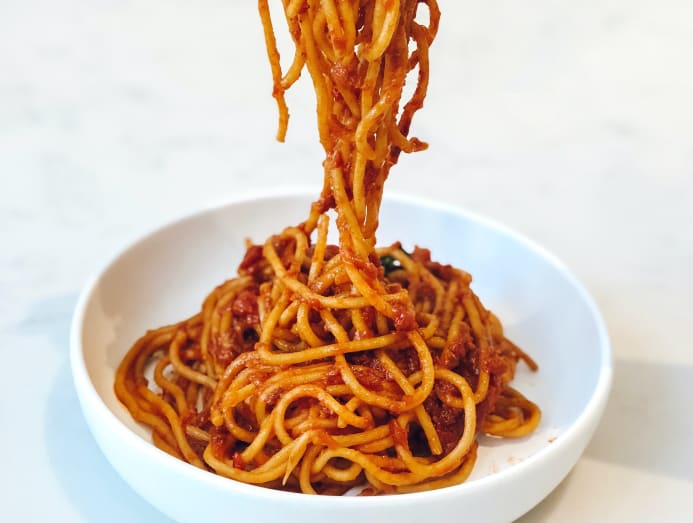
FOR A CHILLED PASTA DISH, CAN I RUN THE BOILED PASTA Under RUNNING H2o TO Absurd IT?
Not unless you desire to lose the precious starch that helps the sauce stick to the pasta, said Tranchero. Running the pasta under water would do exactly that.
More reasons not to wash your pasta: "The pasta is similar a sponge. That'southward why when you add salt to the h2o, it helps to flavour the pasta.
"If you lot leave the cooked pasta nether running water, it absorbs the water and becomes soggy, losing its flavour."
To cool down the boiled pasta, Chuah would immediately spread it out onto a sheet pan and drizzle some olive oil to prevent the pasta from sticking.
"Mix in the vinaigrette or dressing only after the pasta has cooled," he said.
WHY IS MY PASTA E'er SOGGY OR UNDERCOOKED?
Boiling pasta at the wrong temperature would create undercooked pasta, said Chuah. And leaving the noodles in the h2o for as well long (you only need 9 minutes) will consequence in soggy pasta, said Tranchero.
First, brand sure the water is on a rolling boil – non simmering – before adding the pasta, emphasised Tranchero. The water temperature would driblet after the pasta goes in. Simply yous demand to proceed the water boiling throughout.
"Start the timer for nine minutes only after the water has returned to a boil afterwards adding the pasta," he said.
To avoid soggy pasta, take it out of the boiling h2o immediately after ix minutes and permit the pasta cool downwards, said Tranchero. "Leaving the pasta in the h2o for too long, even though information technology is done cooking, would turn the pasta soggy. This is chosen acquit-over cooking."
What every cook wants is the famed state of al dente when the cooked pasta is even so firm and has a little bite. If y'all examine its cross-department, you'll run across a white dot in the middle, explained Tranchero.
"But, of form, not anybody enjoys the al dente texture. The important thing to remember is to taste the pasta and suit the cooking time based on each person'due south pasta texture preference," he said.
Texture bated, soggy and overcooked pasta tin also enhance its glycaemic index. Al dente pasta is healthier as it is digested and captivated slower than mushy pasta.
HOW Practise I KEEP THE COOKED PASTA FROM CLUMPING WHILE THE SAUCE IS STILL COOKING?
"My proffer is to gear up the sauce first," said Tranchero. "Then, boil the pasta." In fact, he recommended preparing the sauce a day or 2 ahead as it allows "the flavour to develop".
But if you've already gone and boiled the pasta before the sauce is ready, Chuah has this saving grace: Add together a piddling drizzle of olive oil into the pasta to coat it and prevent sticking.
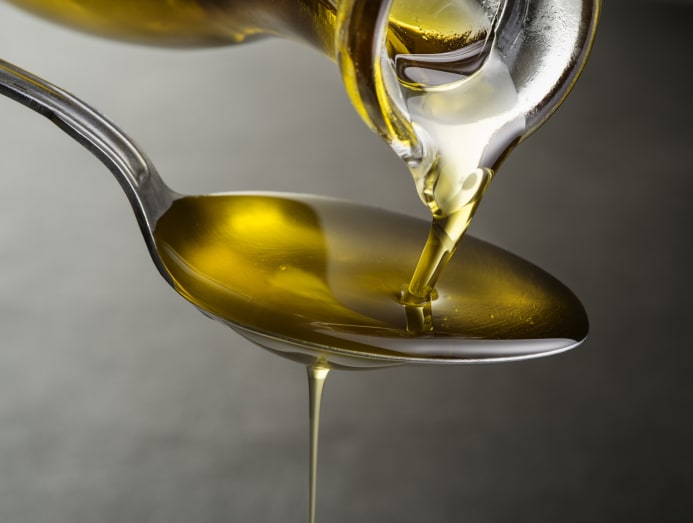
"If the pasta is already clumped up, the only way to divide the pasta is to estrus information technology upwardly and toss it together with the sauce," he said. "Once the starch molecules are heated up, they become more flexible and this way, yous can divide the pasta easily."
I Ever END Upward COOKING Also MUCH PASTA
First, become a kitchen scale. Next, portion 80g to 90g of dried pasta per serving – regardless of pasta type, said Chuah.
Added Tranchero: "If you are cooking for a family unit of four to half-dozen, but use an entire box of pasta that usually weighs 500g".
Source: https://cnalifestyle.channelnewsasia.com/dining/how-cook-perfect-pasta-hacks-tips-al-dente-276841

0 Response to "How to cook perfect pasta: Simple hacks to avoid a soggy mess"
Post a Comment